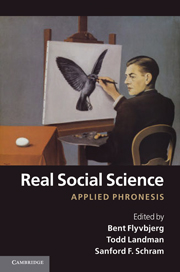Book contents
- Frontmatter
- Contents
- Figures
- Tables
- Contributors
- Acknowledgements
- 1 Introduction: new directions in social science
- Part I Theory and method
- 2 Phronetic social science: an idea whose time has come
- 3 Phronesis and narrative analysis
- 4 The feel for power games: everyday phronesis and social theory
- 5 Phronesis, projects and power research
- Part II Applied phronesis
- 6 Why mass media matter and how to work with them: phronesis and megaprojects
- 7 Power and conflict in collaborative research
- 8 Unsettling a settler society: film, phronesis and collaborative planning in small-town Canada
- 9 Phronesis and critical policy analysis: Heathrow's ‘third runway’ and the politics of sustainable aviation in the United Kingdom
- 10 Amnesty in the age of accountability: Brazil in comparative context
- 11 Feminist phronesis and technologies of citizenship
- 12 Making the teaching of social justice matter
- 13 Spatial phronesis: a case study in geosurveillance
- 14 Important next steps in phronetic social science
- Index
- References
13 - Spatial phronesis: a case study in geosurveillance
Published online by Cambridge University Press: 05 June 2012
- Frontmatter
- Contents
- Figures
- Tables
- Contributors
- Acknowledgements
- 1 Introduction: new directions in social science
- Part I Theory and method
- 2 Phronetic social science: an idea whose time has come
- 3 Phronesis and narrative analysis
- 4 The feel for power games: everyday phronesis and social theory
- 5 Phronesis, projects and power research
- Part II Applied phronesis
- 6 Why mass media matter and how to work with them: phronesis and megaprojects
- 7 Power and conflict in collaborative research
- 8 Unsettling a settler society: film, phronesis and collaborative planning in small-town Canada
- 9 Phronesis and critical policy analysis: Heathrow's ‘third runway’ and the politics of sustainable aviation in the United Kingdom
- 10 Amnesty in the age of accountability: Brazil in comparative context
- 11 Feminist phronesis and technologies of citizenship
- 12 Making the teaching of social justice matter
- 13 Spatial phronesis: a case study in geosurveillance
- 14 Important next steps in phronetic social science
- Index
- References
Summary
Introduction: towards an ethics of discomfort
In his essay ‘For an Ethic of Discomfort’, Foucault provocatively reminds us:
Never consent to being completely comfortable with one's own presuppositions. Never to let them fall peacefully asleep, but also never to believe that a new fact will suffice to overturn them; never to imagine that one can change them like arbitrary axioms, remembering that in order to give them the necessary mobility one must have a distant view, but also look at what is nearby and all around oneself. To be very mindful that everything one perceives is evident only against a familiar and little-known horizon, that every certainty is sure only through the support of a ground that is always unexplored. The most fragile instant has its roots. In that lesson, there is a whole ethic of sleepless evidence that does not rule out, far from it, a rigorous economy of the True and the False; but that is not the whole story.
(1994a: 448)To engage with an ethic of discomfort, as described by Foucault, is to engage in an act of phronesis. In other words: how does one challenge one's own presuppositions and never let them fall peacefully asleep?; how does one cultivate a sense of mindfulness that challenges the certainty of ground unexplored?; how can one address the roots of this fragile instance? In this chapter I will argue that the art of phronesis, with its variants of value rationality, practical rationality and dialogical significance offers a particular kind of understanding to the governance of spatial practices: an approach we can define as spatial phronesis. Phronesis inherently privileges practical wisdom and intuitive understanding alongside the realities of power relations in the construction of knowledge (see Flyvbjerg 2001, 2004). This particular perspective provides powerful ammunition against the hegemonic discourse of neoliberal rationality. Cloaked in the language of efficiency, accountability, competition and scientific logic, the discourse of neoliberal policy insidiously purports a mantra of progress and change. In this way the neoliberal rationale continually moulded, reconfigured and celebrated, as most recently through its Third-Way logics, normalizes an essence of individual freedom, self-interest and entrepreneurial governance, strategically converting along the way a broad populace to its utopian rhetoric (Basu 2009: 482).
Information
- Type
- Chapter
- Information
- Real Social ScienceApplied Phronesis, pp. 264 - 284Publisher: Cambridge University PressPrint publication year: 2012
References
Accessibility standard: Unknown
Why this information is here
This section outlines the accessibility features of this content - including support for screen readers, full keyboard navigation and high-contrast display options. This may not be relevant for you.Accessibility Information
- 3
- Cited by
